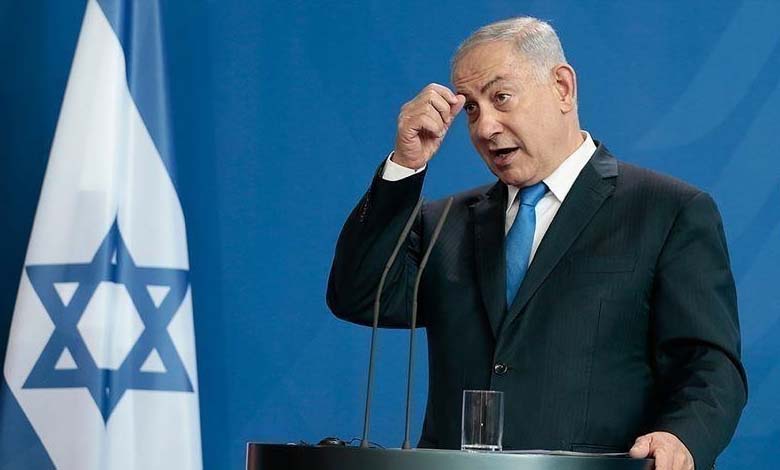Netanyahu Considering Gaza Annexation or Encirclement if Truce Talks Fail

Israel and the United States are working to draft a new framework linking ongoing military operations to an increase in humanitarian aid for Gaza.
A source told CNN that Israeli Prime Minister Benjamin Netanyahu is reviewing potential escalation scenarios, including the complete encirclement or even the invasion of Gaza City, if Hamas refuses to agree to the latest ceasefire and prisoner exchange proposal, as negotiations remain deadlocked.
-
Netanyahu Caught in the Military Trap over Gaza: Generals Rebel, Soldiers Absent
-
To Resolve the Gaza Truce Deadlock: A New Map on Netanyahu’s Table
The source noted that Netanyahu has delayed making any military decisions regarding Gaza, stating that no actions will be taken this week, amid internal disagreements within the Israeli government regarding the strategy in the Strip.
Among the proposed options is the full encirclement of Gaza City and other population centers. Another, more aggressive, suggestion involves a full-scale ground invasion. The source also mentioned that ministers within the government are split, with different officials supporting different strategies.
Recent statements by U.S. and Israeli officials suggest ongoing efforts to define a new approach to the Gaza crisis.
-
No Concessions… Netanyahu Sets Conditions for Palestinian Autonomy
-
Netanyahu Urges Iranians to Rebel Against Regime Following Unprecedented Strikes
Following Hamas’ withdrawal from the ceasefire negotiations, a senior Israeli official told CNN that Israel and the United States are working to formulate a new understanding that would combine continued military activity with a substantial increase in humanitarian aid.
This move follows previous U.S. accusations that Hamas was negotiating in bad faith, prompting U.S. envoy Steve Wietkoff to withdraw both the American and Israeli delegations from the Doha talks.
Nonetheless, a senior Israeli official expressed readiness to resume talks if Hamas changes its stance.
-
Western Sanctions Threats on Israel Rattle Netanyahu
-
The Weapon of Hunger: Netanyahu Threatens Gaza with an Even Greater Humanitarian Catastrophe after Halting Aid
On Thursday, Hamas confirmed its commitment to continuing negotiations but laid out clear conditions for returning to the dialogue table. In a separate statement, the group said it is willing to resume negotiations immediately once aid reaches those in need and the humanitarian crisis and famine in Gaza are addressed.
Senior Hamas leader Bassem Naim emphasized that a significant improvement in the humanitarian situation, along with a written response from Israel to Hamas’ proposals, are prerequisites for resuming talks. He stated that negotiations under famine conditions “lose their essence and effectiveness.”
-
The Reason behind Netanyahu’s Refusal to Allow the Entry of ‘Caravans’ and Heavy Equipment into Gaza
-
October 7 Losses Extend Beyond the Battlefield… Widespread Calls for Netanyahu’s Resignation
These political developments are unfolding alongside continued Israeli military threats. Israeli army chief Herzi Halevi said Friday that the fighting would continue if no deal is reached to free the hostages taken on October 7, 2023.
While visiting troops in Gaza, Halevi stated, “In my view, we will know within days whether we can reach an agreement to free our hostages. If not, we will continue fighting without pause.”
Meanwhile, the humanitarian situation on the ground is worsening. According to the United Nations, all 2.1 million residents of Gaza are facing food insecurity. The Gaza Ministry of Health reports that 900,000 children are experiencing hunger, with 70,000 showing signs of malnutrition.
-
New Leak Scandal Shakes Netanyahu’s Government
-
Netanyahu Sets His Goals after the War: Expanding Peace and a “Hidden Plan” for Iran
The hostage issue remains central to negotiations. Official Israeli figures indicate that around 50 Israeli hostages are still being held in Gaza, with at least 20 confirmed alive.
Hamas recently released a new video of one of the hostages, prompting emotional reactions from his family. His sister described the video as “a million stabs to the heart.”
The latest round of negotiations — mediated by the U.S., Egypt, and Qatar — ended without breakthrough. Israel insists on not withdrawing entirely from Gaza, while Hamas maintains that such a withdrawal is a non-negotiable condition. There is also a dispute over the distribution of humanitarian aid: Israel prefers to retain control through the “Gaza institution,” while Hamas demands the return of UN agencies, especially amid growing famine and malnutrition in several parts of the enclave.
-
On the Eve of Gaza Negotiations Resumption, Netanyahu’s Stance “Shatters” Hostage Families’ Hopes
-
Netanyahu reveals Hezbollah’s plan to invade northern Israel
-
Political Analyst: Netanyahu Seeks Expansion and Annexation of Southern Lebanon under Military Cover
-
Sa’ar the “Rebel” and Netanyahu: From Bitter Foe to “Savior”












